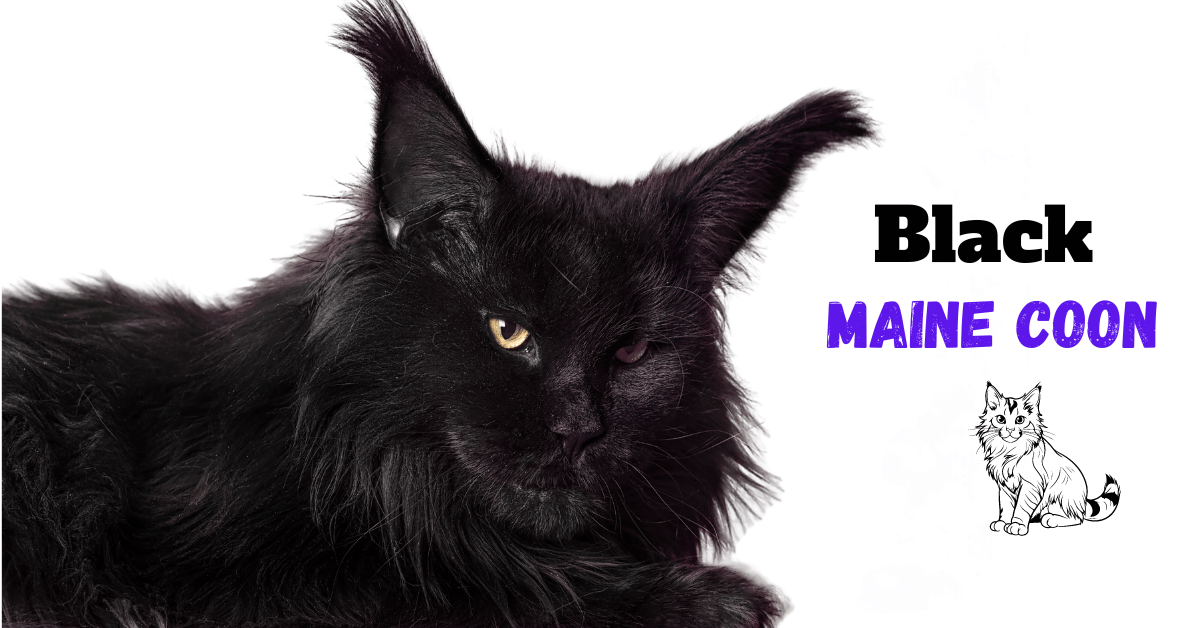This post contains affiliate links and I will be compensated if you make a purchase after clicking on my links.
Introduction: The Enigmatic Black Maine Coon
Unlike their more common brown tabby or white relatives, Black Maine Coons have solid jet black coats, characterized by their deep, uniform color without the brown or reddish undertones typical of other patterns.
Despite being one of many color variants in this breed, the black Maine Coon stands out due to its rich, velvet-like fur, distinctive tufted ears, and luxurious fluffy tail.
Culturally, Black Maine Coons, like all black cats, have been enshrouded in a tapestry of folklore and superstition. In Western societies, they were once feared as harbingers of bad luck—a notion deeply rooted in medieval associations with witchcraft. Conversely, this narrative shifts dramatically in places like Japan, where black cats are celebrated as symbols of good fortune and prosperity.
By transcending mere color, Black Maine Coons share the same endearing personality traits as other Maine Coons, making them not only a visually stunning choice but also a charismatic and affectionate companion.
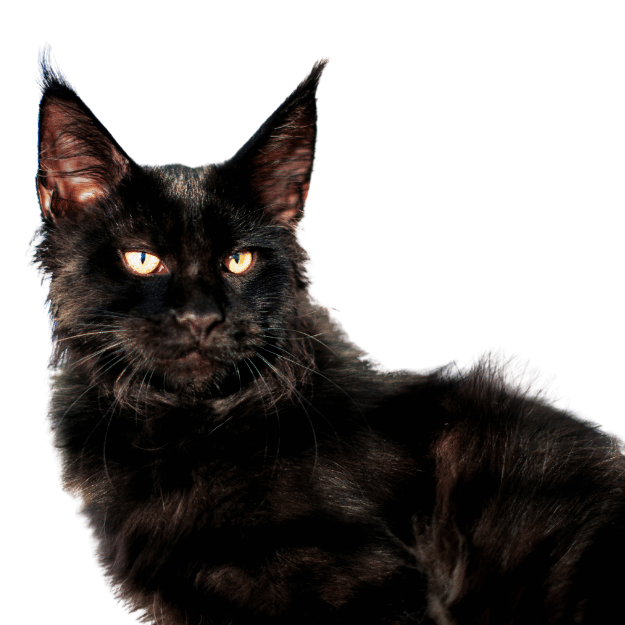
Fun Fact: Edgar Allan Poe’s beloved companion, Pluto, a Black Maine Coon, inspired his chilling short story, ‘The Black Cat.’ This tale was first published in the August 19, 1843, edition of The Saturday Evening Post, weaving Poe’s real-life furry friend into his famously dark storytelling.
Genetics of the Black Maine Coon
The striking black coat of Maine Coon cats is the result of a dominant gene known as the “B” gene, which is pivotal in producing eumelanin, the dark pigment that colors their lush fur. For a Maine Coon to showcase a uniformly solid black coat, it must inherit two copies of this gene (BB), setting the standard for what is often termed ‘black beauty’.
However, breeding Black Maine Coons for specific coat patterns like smoke or classic tabby involves a complex interplay of genes. Each cat’s unique pattern results from this genetic mix, demanding breeders to thoroughly understand the gene pool. Ensuring that at least one parent has the dominant “B” gene is crucial for passing on the distinctive black color.
Fun Fact: One distinctive variant is the Black Smoke Maine Coon, which has a unique smokey appearance due to a darker undercoat that gives them a mysterious air, clearly visible as you get closer.
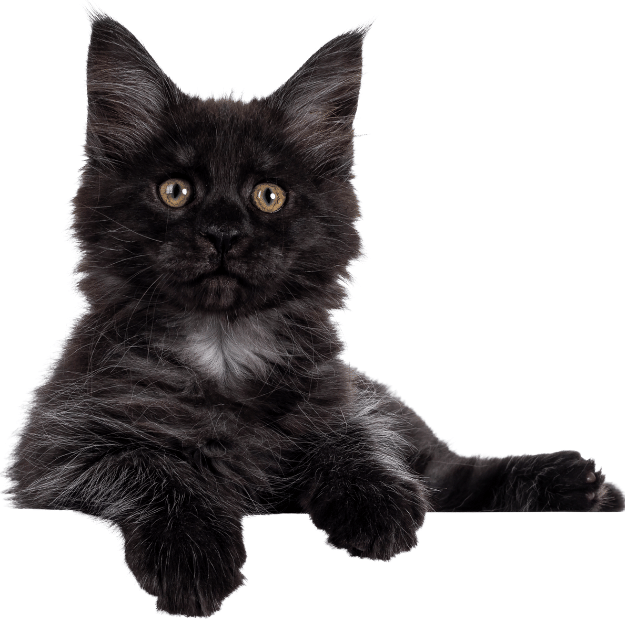
Historical Echoes and Cultural Perceptions
The Black Maine Coon is a breed with a profound historical backdrop and cultural significance. This breed’s journey through time has seen its fair share of highs and lows, including a period of near extinction in the mid-20th century.
During the early years of the 20th century, the introduction of other long-haired breeds like Persians to America contributed to a significant decline in the Maine Coon’s popularity. It plummeted to such an extent that for a span of 40 years, a Maine Coon didn’t clinch a single national cat show title.
Fears of the Maine Coon breed’s extinction were quelled by the Central Maine Cat Club (CMCC), formed in the 1950s, which led a significant revival. Through cat shows, exhibitions, and establishing the first breed standard, these enthusiasts restored the breed’s prominence. Their efforts culminated in the Maine Coon, including the Black Maine Coon, achieving championship status from the Cat Fanciers’ Association by 1976
Just a few years later, in 1979, The International Cat Association (TICA), which was founded by a small group of cat enthusiasts and has grown to become the world’s largest genetic cat registry, readily accepted Black Maine Coons for championship status.
Physical Traits of the Black Maine Coon
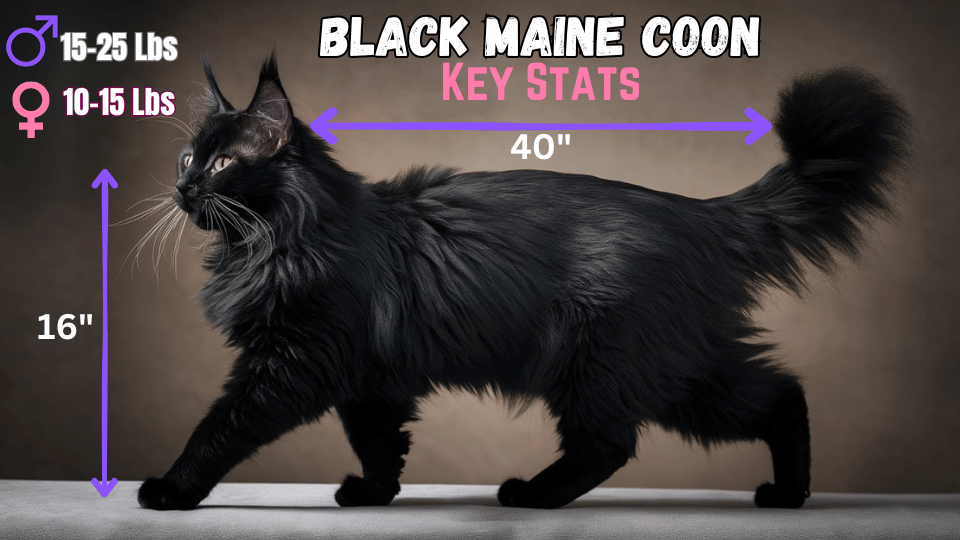
Black Maine Coons are distinguished by their striking, deep black coats, reflecting a range of shades from charcoal to lustrous onyx. Standing 10-16 inches tall and weighing 10-25 pounds, they carry their majestic fur with a presence as substantial as their size.
Adhering to strict breed standards set by the Cat Fanciers’ Association and TICA, Black Maine Coons display a dense, uniformly black coat from the roots to the fur tips. This coat is strictly without rusting or a smoke undercoat, maintaining a pure black appearance. The standards prohibit non-dominant black-based colors like lilac, chocolate, or cinnamon, ensuring that the Black Maine Coon remains true to its dark heritage.
Their triple-layered coat is semi-water-resistant and dense, offering excellent protection against cold climates and harsh weather conditions, which keeps them warm and dry in any weather.
In terms of their facial and paw features, Black Maine Coons have black or brown nose leather and paw pads. Their eyes are captivating, typically gold, green, green-gold, or copper, enhancing their enigmatic appearance. Unlike other variations, Black Maine Coons do not have blue or odd-colored eyes, which are exclusive to white or partially white Maine Coons.
Fun Fact: The vibrant color of their coat can sometimes “rust” when exposed to sunlight, revealing subtle brown or reddish hues. This phenomenon occurs due to a genetic characteristic that can be managed with special shampoos designed to maintain their dark fur, returning it to its original ebony state.
The Personality of Black Maine Coons
While some believe coat color influences personality—like the outgoing nature of ginger kitties or the affectionate demeanor of tabbies—Black Maine Coons shatter the ‘aloof black cat’ stereotype.
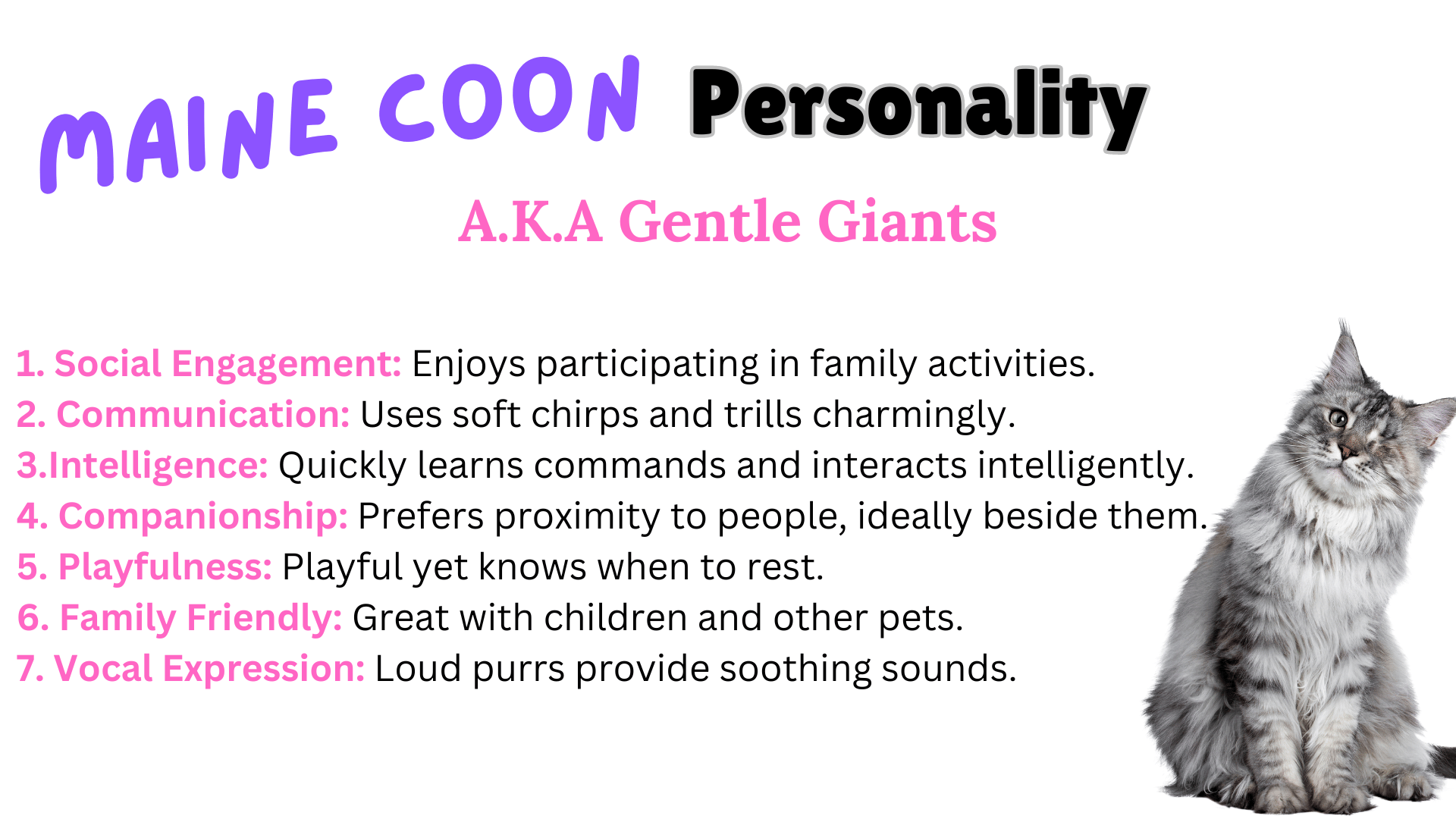
The personality of Maine Coons is consistent across the breed, regardless of coat color.
These cats weave a rich tapestry of affection, sociability, and tranquility into their interactions, making them vibrant family members. Their unique quiet chirps and trills provide a soothing soundtrack to daily life, enriching the home atmosphere with their charming presence.
Far from the distant creatures folklore might suggest, Black Maine Coons thrive on human interaction. They are eager to participate in family activities, whether following owners around the house or snuggling up during movie nights. Their calm and relaxed demeanor makes them perfect companions for both lively families and individuals.
Health and Longevity of Black Maine Coons
Black Maine Coons are sturdy cats with a typical lifespan of 12-15 years. While their black color doesn’t predispose them to specific health issues, they do share common genetic risks with the Maine Coon breed as a whole.
Here are the primary health issues to be aware of:
- Hypertrophic Cardiomyopathy (HCM): This heart condition causes thickening of the heart walls, leading to potential heart failure. Regular vet check-ups can help manage the risk.
- Hip Dysplasia: Common in larger breeds, this joint problem can cause pain and mobility issues. It’s due to the abnormal development of the hip joint, often exacerbated by the Maine Coon’s large size.
- Spinal Muscular Atrophy (SMA): This genetic condition affects the spinal cord’s motor neurons, leading to muscle wasting and weakness, particularly in the hind legs. It doesn’t affect life expectancy or the quality of daily activities severely.
- Polycystic Kidney Disease (PKD): Although more commonly associated with Persian cats, this genetic condition can also affect Maine Coons. It involves the development of cysts on the kidneys, which can lead to renal failure.
- Patellar Luxation: This condition involves the dislocation of the kneecap, which can be painful and cause limping or other mobility issues. It’s seen in many breeds and can affect Maine Coons as well.
- Feline Lower Urinary Tract Diseases (FLUTD): Maine Coons can be susceptible to urinary tract issues, including blockages and infections. Diet and hydration are critical in managing and preventing these conditions.
Responsible breeding practices, including genetic testing and health screenings by breeders, are crucial to minimize the risk of these conditions. Such measures ensure that Black Maine Coon kittens are as healthy as possible, enhancing their overall lifespan and quality of life.
Cost and Considerations When Adopting a Black Maine Coon
Adding a Black Maine Coon to your family is an investment, with costs typically ranging around a thousand dollars or more for a purebred kitten.
The price can vary based on several factors including the cat’s lineage, the breeder’s reputation, and whether the kitten is considered show-quality. While Black Maine Coons aren’t especially rare in color, their high-quality breeding can significantly influence their price.
When choosing a Black Maine Coon, it’s crucial to prioritize reputable breeders. Checking breeder reviews and visiting in person to meet the kittens are essential steps to ensure authenticity and health. Be cautious of prices that seem unusually low, as these can often be indicators of a scam.
Conclusion: Why Choose a Black Maine Coon?
Each color variant of the Maine Coon has its unique appeal, but the elegant black hue carries a distinct charm. While it might be hard to choose a favorite among such beautiful options, the midnight black shade stands out, attracting many admirers.
Due to lingering superstitions about black cats, Black Maine Coons are often more available for adoption. This presents a great opportunity to welcome one of these cherished midnight beauties into your home. In the U.S., their unique charm is celebrated every August 17th on Black Cat Appreciation Day.

